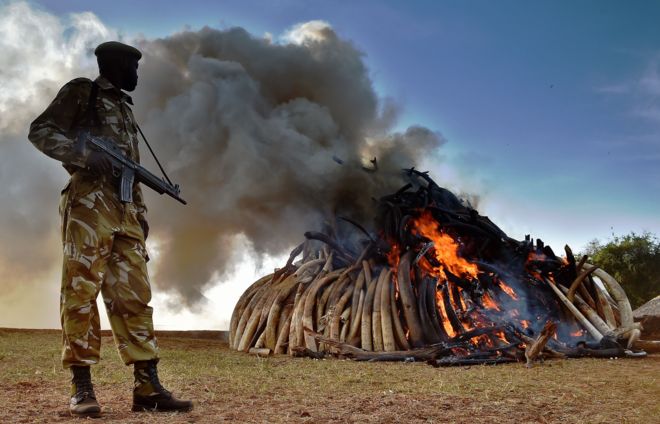{UAH} Uganda investigates vanished ivory haul
Uganda investigates vanished ivory haul
 AFP PHOTO/CARL DE SOUZA
AFP PHOTO/CARL DE SOUZAUganda's President Yoweri Museveni has ordered a new investigation into the disappearance of ivory from government strong rooms.
About 1.3 tonnes (2,866 lbs) of ivory vanished from the country's Wildlife Authority in November 2014.
Mr Museveni said the Wildlife Authority's Executive Director Andrew Segguya is potentially implicated.
However, Mr Segguya has maintained his innocence, saying he launched an audit after the ivory went missing.
The president has also accused two Chinese diplomats of ivory trafficking - a claim China denies.
A spokeswoman for Uganda's top anti-corruption body said the two Chinese embassy officials are suspected of helping move ivory from the Democratic Republic of Congo, the Central African Republic, and South Sudan, by passing it through Uganda.
China has dismissed the allegations as "totally unfounded".
Foreign ministry spokeswoman Hua Chunying told journalists: "We have rigorous regulations and laws on governmental officials, embassy members, and visiting groups to forbid them from buying or engaging in (smuggling) activities."
She added that if the claims were proven, the pair would be punished.
In December, China announced that it would ban all ivory trading and processing activities by the end of 2017.
Ivory is a status symbol in the Asian country and sells for about £852 ($1,100) per kilo.
Uganda is a popular smuggling route for the illegal trade in African ivory and rhino horn, which are still used in some traditional Chinese medicines.
Recent years have seen an upswing in poaching, with more than 35,000 elephants killed across Africa every year for their tusks.
- Uganda suspends officials over ivory 'disappearance'
- Can China's ivory trade ban save elephants?
- Stockpiles of dead tiger and rhino body parts go up in smoke in Nepal
- Poachers kill rhino for his horn at French zoo
- Tanzania jails notorious elephant poacher
- Dogs on the frontline of the elephant poaching crisis
Disclaimer:Everyone posting to this Forum bears the sole responsibility for any legal consequences of his or her postings, and hence statements and facts must be presented responsibly. Your continued membership signifies that you agree to this disclaimer and pledge to abide by our Rules and Guidelines.To unsubscribe from this group, send email to: ugandans-at-heart+unsubscribe@googlegroups.com




0 comments:
Post a Comment